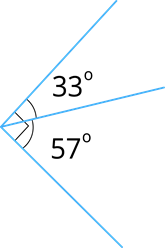UPSKILL MATH PLUS
Learn Mathematics through our AI based learning portal with the support of our Academic Experts!
Learn moreIn this chapter, you will study about the 'Pair of Angles' formed by intersecting lines and transversal lines. But before that, let's recall the basics of geometry which you're learned in the previous class.
Angles:
When two rays diverge from a common point, they are called angles.
The rays which form an angle are called the angle arms, and the common point is called the angle vertex.
We may summarize the various types of angle as follows:
Acute angle | An angle is called an acute angle whose measure is less than \(90°\). | |
Right angle | An angle is called a right angle whose measure is exactly \(90°\). It looks like the corner of a square. | |
Obtuse angle | An angle is an obtuse angle whose measure is greater than \(90°\). | |
Straight angle | An angle is called a straight angle whose measure is exactly \(180°\). | |
Reflex angle | An angle is called a reflex angle whose measure is greater than \(180°\) and less than \(360°\). |
Complementary angles:
Two angles are called Complementary angles if their sum is \(90°\).
The angle pair \(33°\) and \(57°\) are complementary, where the angle \(33°\) is said to complement of the other angle \(57°\), and vice versa.

Supplementary angles:
Two angles are called Supplementary angles if their sum is \(180°\).
\(180°\) is the sum of the angle whose measures \(72°\) and \(108°\) given in the figure. When two angles are supplementary, it is said that each angle is the addition of the other.
